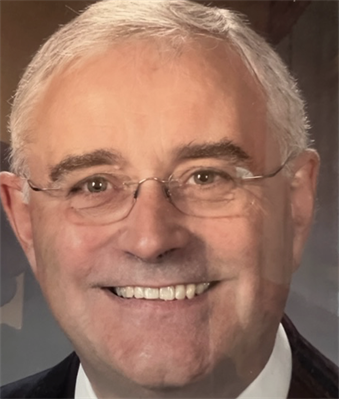
Professor George Griffin graduated in Medicine at St George’s in 1974, and his relationship with the university has spanned his whole career. He spoke to us about how his love of Medicine led to him implementing major developments within Infection and Immunity at St George’s, as well as initiating policy for health in the UK and EU.
“There was nothing in medicine that I didn’t find exciting and stimulating.”
Before joining the Medicine programme at St George’s, Professor Griffin studied BSc Pharmacology at King’s College London. After his BSc, he chose to complete a PhD in Muscle Cell Biology and says: “My fascination for, and curiosity about, Biomedical Science led me to complete my PhD. But I always knew my long-term aim was to be a clinical doctor. There was nothing in medicine that I didn’t find stimulating and challenging.”
After studying at St George’s, Professor Griffin was awarded a prestigious Harkness Fellowship for Harvard University, where he spent three years studying at the Department of Physiology before returning to the UK to qualify as a doctor.
“I feel very fortunate to have had fantastic mentors and teachers at St George’s, Kings and Harvard to help me along on my career path.”
On his return, he took on a number of roles, including prestigious Senior House Officer and Registrar posts in Gastroenterology Royal at the Royal Postgraduate Medical School (now Imperial College School of Medicine), before being invited back to St George’s as a Lecturer in Medicine.
During this time, he worked alongside Professor Harold Lambert, who had taught Professor Griffin as a student and was instrumental in establishing Infection as an academic speciality. Professor Griffin says: “Harold’s teaching had a huge influence on me during my time as a student, and I feel very fortunate to have had fantastic mentors and teachers like him to help me along on my career path.”
Over the years, Professor Griffin’s work has developed a strong research base aimed at defining how humans with TB and HIV respond to infection and vaccines. Alongside Professor Harold Lambert and Dr Mark Wansbrough-Jones, he also developed and led our Institute for Infection and Immunity (I&I), renowned for its research, collaboration and training. He later set up our Vaccine Institute, whose team research new and existing vaccines to tackle diseases which disproportionately affect vulnerable populations.
He says of his work to develop these institutes: “I was proud to be involved in the development of facilities that allow us to better understand how the immune system works, and vaccination is the most important element of fighting infection.”
“St George’s is a big part of me.”
Professor Griffin is now one of Europe’s leading experts on infectious diseases and public health. He has also been involved in shaping policy for medicine, becoming a member of the Academy of Medical Sciences and later, Vice President (International) and Board Member of Public Health England.
In 2018, Professor Griffin became President of the Federation of the European Academies of Medicine and was awarded a CBE in health research & contributions to public health. He also helped shape vaccine policy during the Covid-19 pandemic and is currently working with the European Federation on pandemic preparedness.
Professor Griffin continues as Emeritus Professor at St George’s, and maintains strong links to I&I, saying: “St George’s is a major part of my life, and I maintain links with many of my former colleagues and classmates. It was a great privilege to study medicine here, and it opened up many different pathways to develop a successful clinical and academic career.”
You can hear more about Professor Griffin’s career path in this interview with Elsevier Health education.